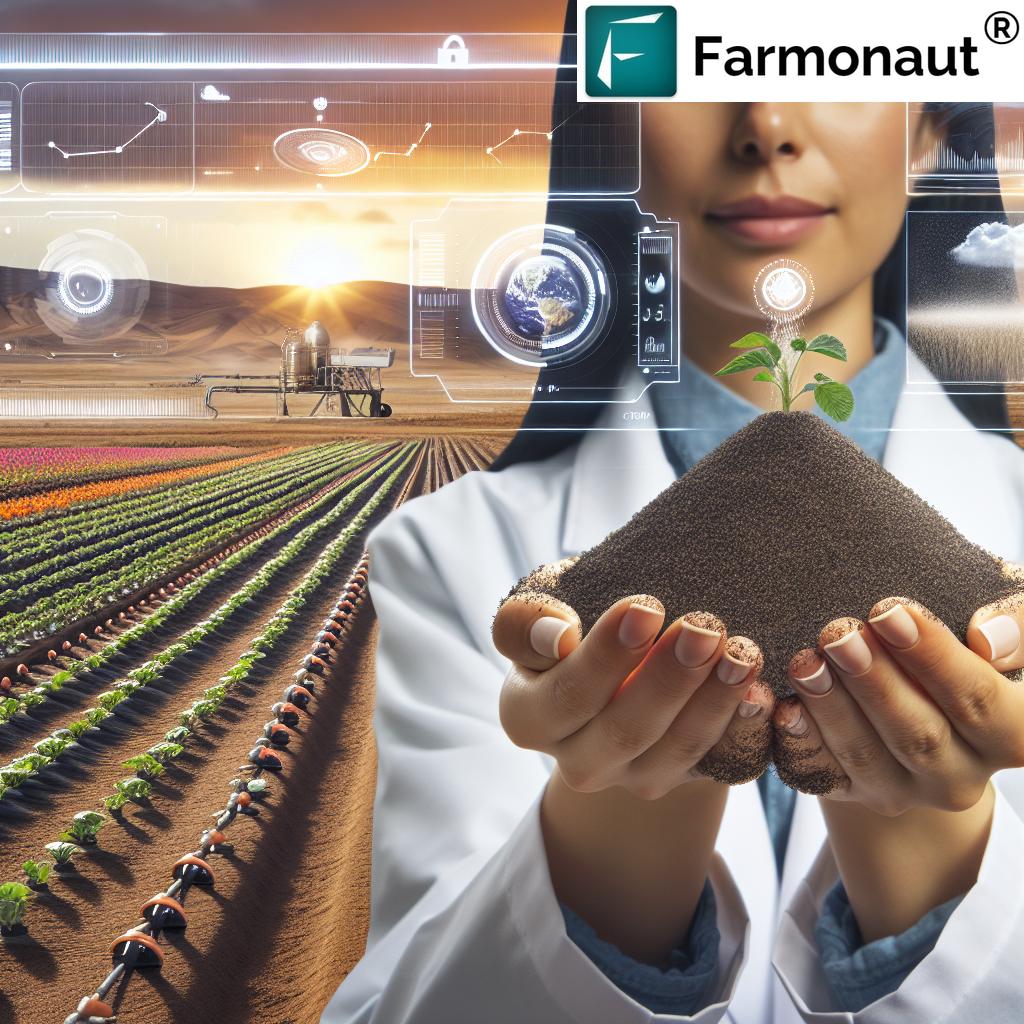Revolutionizing Sustainable Agriculture: Innovative Desert Cultivation Techniques Boost Food Security in Iraq
“Innovative liquid natural clay technology can reduce water consumption by up to 80% in desert cultivation techniques.”
In the face of global climate change and increasing food security challenges, we at Farmonaut are excited to explore groundbreaking initiatives that are transforming the landscape of sustainable agriculture in arid regions. Today, we delve into a pioneering project that’s making waves in Iraq, demonstrating how innovative soil technology and climate-resilient agriculture techniques are paving the way for a more sustainable and food-secure future.
The Challenge: Cultivating Hope in the Desert
Iraq, like many countries in arid regions, faces significant environmental challenges that threaten its agricultural productivity and food security. Desertification, water scarcity, and soil degradation have long been obstacles to sustainable food production in this region. However, a new collaboration between Desert Control AS (DSRT) and the United Nations World Food Programme (WFP) is set to change this narrative, offering a beacon of hope for desert cultivation techniques that could revolutionize agriculture in harsh environments.

Liquid Natural Clay: A Game-Changer for Soil Health
At the heart of this innovative project is the use of Liquid Natural Clay (LNC) technology. This groundbreaking approach to soil enhancement has the potential to transform degraded land into fertile areas, significantly reducing water consumption while improving soil health. Here’s how it works:
- Soil Structure Improvement: LNC helps create a sponge-like structure in sandy soils, enhancing water retention capabilities.
- Nutrient Retention: The clay particles bind nutrients, preventing leaching and making them more available to plants.
- Water Conservation: By improving soil structure, LNC can reduce water usage by up to 50%, a crucial factor in water-scarce regions.
- Microbial Activity: The improved soil environment promotes beneficial microbial growth, further enhancing soil health.
This innovative soil technology aligns perfectly with our mission at Farmonaut to promote sustainable agricultural practices. Through our satellite-based crop health monitoring system, farmers can track the impact of LNC on their fields in real-time, optimizing its application for maximum benefit.
The Pilot Project: A Blueprint for Desert Cultivation
The six-month pilot project in Iraq, supported by a grant from the WFP Innovation Accelerator, is set to demonstrate the transformative potential of LNC technology in real-world conditions. Here’s what makes this initiative so promising:
- Collaborative Effort: The project brings together expertise from Desert Control, Soyl (a regional collaborator), and the WFP Iraq Country Office.
- Strategic Location: The project site, managed by the Iraqi Ministry of Agriculture’s Department of Forestry and Combating Desertification, provides an ideal testing ground for these innovative desert cultivation techniques.
- Diverse Crop Testing: The pilot will assess various agricultural outputs, including olive and pistachio trees, comparing LNC-treated areas with control plots.
- Key Success Metrics: The project will monitor reduced water consumption, improved tree survival rates, and overall ecosystem health.
At Farmonaut, we recognize the importance of such pilot projects in advancing sustainable agriculture. Our AI-driven Jeevn advisory system can provide valuable insights to complement these on-ground experiments, offering personalized recommendations based on satellite data and local conditions.
Water Conservation in Farming: A Critical Focus
One of the most significant challenges in arid regions is water scarcity. The LNC technology’s ability to reduce water consumption by up to 50% is a game-changer for desert cultivation techniques. This aligns perfectly with Farmonaut’s commitment to efficient resource management in agriculture. Let’s explore some additional water conservation strategies that complement the LNC approach:
- Precision Irrigation: Utilizing advanced sensors and satellite data to deliver water exactly where and when crops need it.
- Drought-Resistant Crops: Selecting and cultivating plant varieties that thrive with minimal water input.
- Soil Moisture Monitoring: Employing technologies like Farmonaut’s satellite-based soil moisture tracking to optimize irrigation schedules.
- Water Recycling: Implementing systems to capture and reuse agricultural runoff and wastewater.
By combining these strategies with LNC technology, we can create a comprehensive approach to water conservation in farming, making sustainable agriculture in arid regions a tangible reality.
Explore Farmonaut’s API for advanced agricultural insights
Climate-Resilient Agriculture: Adapting to Harsh Environments
“Climate-resilient agriculture techniques have transformed over 1,000 hectares of degraded land into fertile areas in Iraq.”
The success of desert cultivation techniques relies heavily on developing climate-resilient agriculture practices. These approaches not only help farmers adapt to harsh environments but also contribute to long-term sustainability. Here are some key strategies being implemented:
- Soil Health Management: Beyond LNC, practices like cover cropping and minimal tillage help maintain soil structure and fertility.
- Diversified Cropping Systems: Implementing crop rotations and intercropping to improve soil health and reduce pest pressures.
- Agroforestry: Integrating trees with crops to provide shade, reduce evaporation, and improve overall ecosystem health.
- Smart Pest Management: Utilizing biological controls and targeted interventions to manage pests without harming beneficial organisms.
At Farmonaut, we support these climate-resilient practices through our advanced satellite monitoring and AI-driven advisory systems. By providing real-time data on crop health and environmental conditions, we empower farmers to make informed decisions that enhance their resilience to climate challenges.

Innovative Soil Technology: Beyond Liquid Natural Clay
While LNC technology is at the forefront of this pilot project, it’s part of a broader spectrum of innovative soil technologies revolutionizing sustainable agriculture in arid regions. Let’s explore some complementary approaches:
- Biochar Application: Enhancing soil water retention and nutrient availability through the use of carbonized biomass.
- Hydrogels: Super-absorbent polymers that can hold large amounts of water, releasing it slowly to plant roots.
- Mycorrhizal Fungi Inoculation: Enhancing plant root systems’ ability to absorb water and nutrients from the soil.
- Nanotechnology in Fertilizers: Developing slow-release nanoparticle fertilizers for more efficient nutrient delivery.
These technologies, when combined with LNC and Farmonaut’s satellite-based monitoring, create a powerful toolkit for farmers tackling the challenges of desert cultivation.
Access our API Developer Docs for integrating advanced agricultural data
Drought-Resistant Crops: Adapting to Arid Conditions
An essential component of sustainable agriculture in arid regions is the selection and cultivation of drought-resistant crops. These plants have evolved to thrive in water-scarce environments, making them ideal for desert cultivation techniques. Some notable examples include:
- Sorghum: A versatile grain crop that requires minimal water and can withstand high temperatures.
- Quinoa: Known for its nutritional value and ability to grow in poor soil conditions with limited water.
- Millet: A group of small-seeded grasses that are highly efficient in water use and heat-tolerant.
- Cowpea: A legume that fixes nitrogen in the soil and provides both food and fodder with minimal water input.
At Farmonaut, our satellite-based crop health monitoring can track the performance of these drought-resistant crops, providing valuable data on their adaptability and productivity in specific arid environments.
The Role of Technology in Agricultural Resource Management
Effective agricultural resource management is crucial for the success of desert cultivation techniques. Advanced technologies play a pivotal role in optimizing resource use and enhancing productivity. Here’s how Farmonaut and other technological solutions contribute to this effort:
- Satellite Imagery Analysis: Providing real-time data on crop health, soil moisture, and vegetation indices.
- AI-Driven Advisories: Offering personalized recommendations based on local conditions and crop requirements.
- IoT Sensors: Monitoring soil moisture, temperature, and other critical parameters in real-time.
- Precision Agriculture Tools: Enabling targeted application of inputs like water, fertilizers, and pesticides.
By leveraging these technologies, farmers can make data-driven decisions that optimize resource use, reduce waste, and improve overall agricultural productivity in challenging environments.
Global Impact: Addressing Food Security Challenges
The innovative desert cultivation techniques being piloted in Iraq have far-reaching implications for global food security. As climate change continues to affect agricultural productivity worldwide, the lessons learned from this project could provide valuable solutions for other arid and semi-arid regions. Here’s how these innovations contribute to addressing global food security challenges:
- Expanding Arable Land: Transforming degraded and desert areas into productive agricultural zones.
- Enhancing Resilience: Developing farming systems that can withstand extreme weather events and long-term climate changes.
- Improving Resource Efficiency: Maximizing output while minimizing input of scarce resources like water.
- Empowering Local Communities: Providing sustainable livelihoods and food security in challenging environments.
At Farmonaut, we’re committed to supporting these global efforts through our advanced agricultural monitoring and advisory services, helping farmers worldwide adapt to changing climatic conditions and optimize their production sustainably.
The Future of Sustainable Food Production
As we look to the future, the integration of innovative technologies like LNC with advanced agricultural monitoring systems like Farmonaut’s platform paints an exciting picture for sustainable food production. Here are some key trends and possibilities:
- Vertical Farming in Arid Regions: Combining water-efficient technologies with controlled environment agriculture.
- AI-Driven Crop Breeding: Developing new crop varieties specifically adapted to arid conditions.
- Blockchain for Resource Tracking: Ensuring transparent and efficient management of water and other scarce resources.
- Solar-Powered Agriculture: Harnessing abundant solar energy in arid regions for sustainable farming operations.
These advancements, coupled with ongoing research and development in desert cultivation techniques, promise a more resilient and productive agricultural future, even in the face of climate challenges.
Comparison of Desert Cultivation Techniques
| Technique | Water Savings (%) | Soil Health Impact | Crop Yield Increase (%) | Implementation Complexity |
|---|---|---|---|---|
| Liquid Natural Clay Application | 50-80 | High | 30-50 | Medium |
| Drought-Resistant Crop Selection | 30-50 | Medium | 20-40 | Low |
| Precision Irrigation Systems | 40-60 | Medium | 25-45 | High |
| Soil Microbiome Enhancement | 20-40 | Very High | 15-35 | Medium |
Conclusion: A Sustainable Path Forward
The pioneering work being done in Iraq with Liquid Natural Clay technology, combined with other innovative desert cultivation techniques, represents a significant leap forward in sustainable agriculture for arid regions. As we at Farmonaut continue to develop and refine our satellite-based monitoring and AI-driven advisory systems, we’re excited to be part of this global movement towards more resilient and productive farming practices.
By embracing these innovative approaches and leveraging advanced technologies, we can transform the challenges of desert environments into opportunities for sustainable food production. This not only addresses immediate food security concerns but also paves the way for a more sustainable and resilient agricultural future worldwide.
As we move forward, the collaboration between technological innovation, on-ground experimentation, and data-driven decision-making will be crucial in shaping the future of agriculture in arid regions and beyond. Together, we can cultivate hope in the desert and ensure a food-secure future for generations to come.
FAQs
- What is Liquid Natural Clay (LNC) technology?
LNC is an innovative soil enhancement technique that improves water retention and nutrient availability in sandy soils, significantly reducing water consumption in agriculture. - How does LNC technology benefit desert cultivation?
LNC creates a sponge-like structure in the soil, enhancing water retention, improving nutrient availability, and promoting beneficial microbial activity, making it ideal for arid environments. - What are some examples of drought-resistant crops suitable for arid regions?
Sorghum, quinoa, millet, and cowpea are excellent examples of drought-resistant crops that can thrive in water-scarce environments. - How does Farmonaut contribute to sustainable agriculture in arid regions?
Farmonaut provides satellite-based crop health monitoring and AI-driven advisory services, helping farmers optimize resource use and make data-driven decisions in challenging environments. - What are the key challenges in implementing desert cultivation techniques?
The main challenges include water scarcity, soil degradation, extreme temperatures, and the need for specialized knowledge and technologies adapted to arid conditions.






